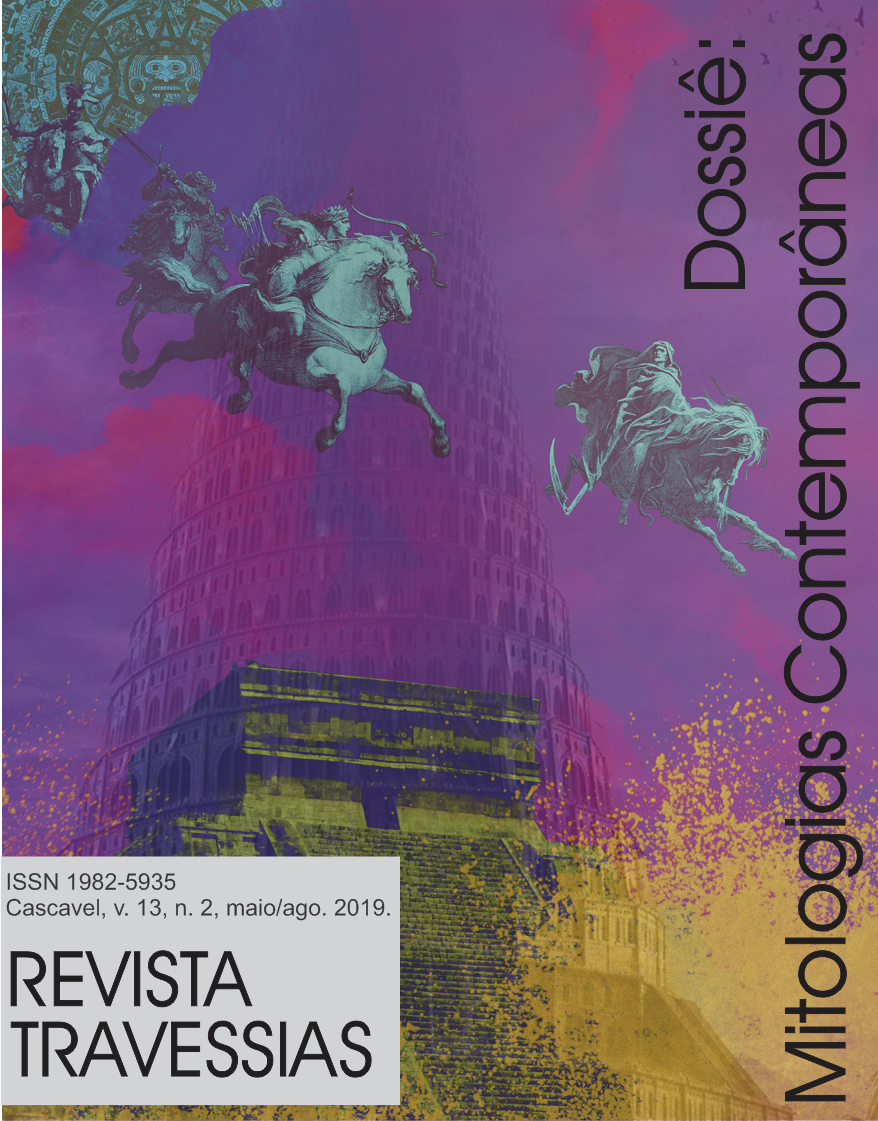Quignard: on metamorphoses and the enigmatic language
Keywords:
Pascal Quignard, enigma, contemporary literature, mythology.Abstract
The present article brings the tale of the French writer Quignard, The Enigma (2018), a contemporary narrative, which recovers the tragedy of Oedipus King, as well as the themes of destiny, fatality and desire. It is a qualitative research, having as theoretical scope for the interpretative reading of the short story, the analytical psychology, formulated by Jung (1991a and 1991b); the study of mythologies, by Durand (2001), Estés (2014) and Migdgley (2014); The symbolisms of the encyclopedia Man, Myth and Magic (1974a and 1974b) and contemporary literary theory include the authors: Foucault (2007), Lima (1996) and Ricoeur (1994). In the tale, after the narrative, there is a section called “comments” which will be explored also throughout the article. The story presents a boy who, when expelled from home by his mother, seeks the reunion with the lost word, enabling the enigma and enchantment of the riddle, triggering the realization of his own destiny. The experience of language and the deciphering of the world comes before the symbolism of metamorphoses experienced by the boy throughout the plot, so that he can accept himself and go through a process of initiation. Language as a puzzle to be solved goes through a series of inscriptions of the little hero.
Downloads
References
COMPAGNON, Antonie. O demônio da teoria: literatura e senso comum. Trad. de Cleonice Paes Barreto Mourão. Belo Horizonte: Ed. UFMG, 1999.
DURAND, Gilbert. As estruturas do imaginário: introdução à arqueologia geral. Trad. de Hélder Godinho. 2 ed. São Paulo: Martins Fontes, 2001.
ESTÉS, Clarissa. P. Mulheres que correm com os lobos: mitos e histórias do arquétipo da mulher. Trad. de Waldéa Barcellos. Rio de Janeiro: Rocco, 2014.
FOUCAULT, Michel. Representar. In: As palavras e as coisas: uma arqueologia das ciências humanas. Trad. de Salma T. Muchail. 9 ed. São Paulo: MARTINS Fontes, 2007.
GOETHE, Johann. W. V. Os anos de aprendizagem de Wilhelm Meister. Trad. de Nicolino Simone Neto. São Paulo. Editora 34, 2009.
HOMEM, Mito & Magia. Editora Três. São Paulo, 1974a. vol. I.
HOMEM, Mito & Magia. Editora Três. São Paulo, 1974b. vol. II.
JUNG, Carl. G. Relação da psicologia analítica com a obra de arte poética. In: O espírito na arte e na ciência. Rio de Janeiro: Petrópolis, 1991a.
JUNG, C. G. Psicologia e poesia. In: O espírito na arte e na ciência. Rio de Janeiro: Petrópolis, 1991b.
JUNG, Carl. G. O homem e seus símbolos. Trad. de Maria Lúcia Pinho. 3 ed. Especial. Rio de Janeiro. HarperCollins Brasil, 2016.
LIMA, Luiz. C. Mímesis e modernidade: Forma das sombras. 2 ed. Rio de Janeiro: Graal, 1996.
MIDGLEY, Mary. A presença dos mitos em nossas vidas. Trad. de Alzira Allegro. São Paulo: Editora Unesp, 2014.
PERRONE-MOISÉS. Leila. Mutações da literatura no século XXI. São Paulo: Companhia das Letras, 2016.
QUIGNARD, Pascal. O Enigma. In: O nome na ponta da língua. Trad. Yolanda Vilela, Ruth Silviano Galvão. Belo Horizonte: Chão de Feira, 2018.
RICOEUR, Paul. Tempo e narrativa – A tríplice narrativa. In: Tempo e narrativa. São Paulo: Papirus, 1994.
WAIBLINGER, Angela. A grande mãe e a criança divina: mito e arquétipo sobre o milagre da vida como desenvolvimento da alma. Trad. de Tatiana Tuermorezow. 2 ed. São Paulo: Cultrix, 2017.
Downloads
Published
How to Cite
Issue
Section
License
Creative Copyright Notice
Policy for Free Access Journals
Authors who publish in this journal agree to the following terms:
1. Authors keep the copyright and grant the journal the right of first publication, with the work simultaneously licensed under the Creative Commons Attribution License, which allows sharing the trial with acknowledgment of authorship and initial publication in this journal.
2. Authors are authorized to take additional contracts separately, for non-exclusive distribution of the work version, published in this journal (eg publish in institutional repository or as a book chapter), with acknowledgment of authorship and initial publication in this journal.
3. Authors are allowed and encouraged to publish and distribute their work online (eg in institutional repositories or on their personal page) at any point before or during the editorial process, as this can generate productive changes, as well as increase both impact and citation of the published trial (See The Effect of Free Access).
Creative Commons License
This work is licensed under a Creative Commons Attribution–NonCommercial-shareaswell 4.0 International License, which allows you to share, copy, distribute, display, reproduce, completely or part of the work, since there is no commercial purpose, and authors and source are cited.



